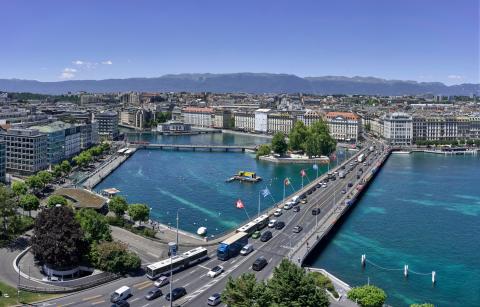
The 16th International Anti-Corruption Conference (IACC)
The 16th IACC will take place in Putrajaya, Malaysia, from the 2nd – 4th September 2015. The Conference will be jointly hosted with the Government of Malaysia, the Malaysian Anti-Corruption Commission (MACC), and the Malaysian Society for Transparency and Integrity (TI Malaysia). The theme of the conference is Ending Impunity: People. Integrity. Action.
Jonas Moberg, Head of the EITI International Secretariat, will participate in a panel "The devil's in the details: mechanics of corruption in the oil, gas and mining industry"
Thursday September 3, 2015 08:30 - 10:30
Many actors have acknowledged that oil, gas and mining sectors are prone to corruption, thanks largely to the high financial stakes and weak oversight. Of the 427 cases reviewed in the 2014 OECD Foreign Bribery Report, 19% came from the extractive sector; 23% of the 176 cases prosecuted under the US Foreign Corrupt Practices Act were from the oil and gas industry alone. In recognition of this trend, groups including the OECD, UNDP the G20 Anti-Corruption Working Group, and several TI chapters are actively working to develop new tools for mapping and mitigating extractive sector corruption risks.
Examining actual cases of extractive sector corruption can reveal how these abuses of power unfold in practice – crucial for generating well-informed response strategies. Empirical analysis that dissects actual corruption cases is in short supply, and is discouraged by several factors: the cases are deeply complex, they often do not end in straightforward verdicts or contain incontrovertible proof that corruption took place, and they involve very powerful governments and companies.
The panel forms part of an effort to address this gap. NRGI will present two prongs of a new research effort. The first analyzes corruption incidence data from multiple sources (FCPA, Ethixbase, Trace Compendium, OECD, and others) to learn more about what kinds of corruption take place, where, and how it is being reported and enforced. The second examines 30 corruption cases – from the Petrobras scandal still raging to the FCPA prosecution of Haliburton’s bribery in Nigeria – for common trends, including the location on the extractive sector value chain where the case happened, role of middlemen, and the legal context. Global Witness has documented many cases of corruption, and will offer evidence from this body of work for how secret corporate structures can enable corrupt practices. The other proposed speakers have engaged directly with specific corruption cases, either as enforcement actors or as journalists, and will offer real world impressions for why corruption plays out the way it does in the high-stakes extractive sector.
Drawing extensively on real-world examples, the panel will offer new and provocative answers to questions such as:
• Which parts of oil, gas and mining sector governance (e.g. license allocations, regulation, revenue collection, etc.) are most prone to abuse, and what kind of losses result from these various cases?
• What kinds of extractive sector corruption are prosecuted most widely, by what countries, and to what end? What does this tell us about what corruption is not detected, and therefore a site of impunity?
• How do public officials abuse transactions to benefit their personal or political interests? What tools are at their disposal, such as secrecy jurisdictions, enabling professionals, etc.?
• How do various types of companies engage in corrupt transactions? How do the mechanics and impacts differ when the company involved serves the interest of a public official, as opposed to a company pursuing its own agenda via corrupt means?
• How do corrupt officials and businessmen hide their money? How do international actors facilitate these transactions?
Answers to these questions will help anti-corruption fighters (from Ministries, ACAs, civil society and media) to focus their oversight and investigation efforts on specific identified parts of the oil, gas and mining sector governance, specific actors or specific transactions, and will provide insights into designing more tailored and better informed A-C programs for the sector. They will also contribute to inform the business sector on the dimensions most prone to corruption in their activities/operations.
Examining actual cases of extractive sector corruption can reveal how these abuses of power unfold in practice – crucial for generating well-informed response strategies. Empirical analysis that dissects actual corruption cases is in short supply, and is discouraged by several factors: the cases are deeply complex, they often do not end in straightforward verdicts or contain incontrovertible proof that corruption took place, and they involve very powerful governments and companies.
The panel forms part of an effort to address this gap. NRGI will present two prongs of a new research effort. The first analyzes corruption incidence data from multiple sources (FCPA, Ethixbase, Trace Compendium, OECD, and others) to learn more about what kinds of corruption take place, where, and how it is being reported and enforced. The second examines 30 corruption cases – from the Petrobras scandal still raging to the FCPA prosecution of Haliburton’s bribery in Nigeria – for common trends, including the location on the extractive sector value chain where the case happened, role of middlemen, and the legal context. Global Witness has documented many cases of corruption, and will offer evidence from this body of work for how secret corporate structures can enable corrupt practices. The other proposed speakers have engaged directly with specific corruption cases, either as enforcement actors or as journalists, and will offer real world impressions for why corruption plays out the way it does in the high-stakes extractive sector.
Drawing extensively on real-world examples, the panel will offer new and provocative answers to questions such as:
• Which parts of oil, gas and mining sector governance (e.g. license allocations, regulation, revenue collection, etc.) are most prone to abuse, and what kind of losses result from these various cases?
• What kinds of extractive sector corruption are prosecuted most widely, by what countries, and to what end? What does this tell us about what corruption is not detected, and therefore a site of impunity?
• How do public officials abuse transactions to benefit their personal or political interests? What tools are at their disposal, such as secrecy jurisdictions, enabling professionals, etc.?
• How do various types of companies engage in corrupt transactions? How do the mechanics and impacts differ when the company involved serves the interest of a public official, as opposed to a company pursuing its own agenda via corrupt means?
• How do corrupt officials and businessmen hide their money? How do international actors facilitate these transactions?
Answers to these questions will help anti-corruption fighters (from Ministries, ACAs, civil society and media) to focus their oversight and investigation efforts on specific identified parts of the oil, gas and mining sector governance, specific actors or specific transactions, and will provide insights into designing more tailored and better informed A-C programs for the sector. They will also contribute to inform the business sector on the dimensions most prone to corruption in their activities/operations.



